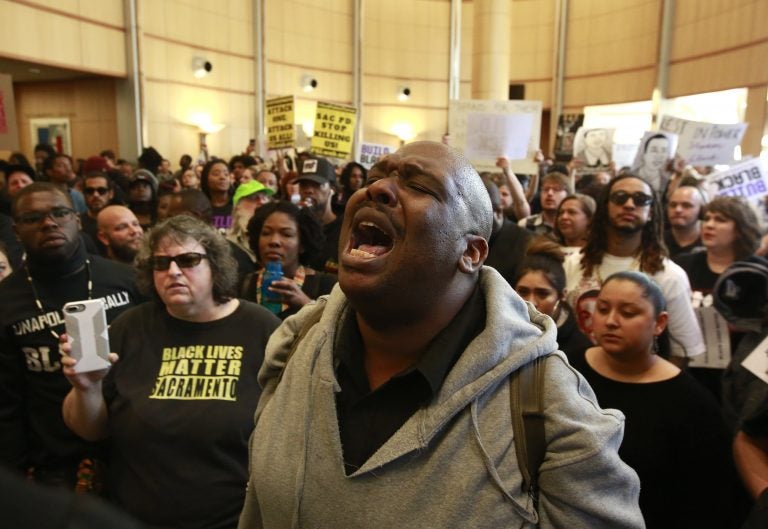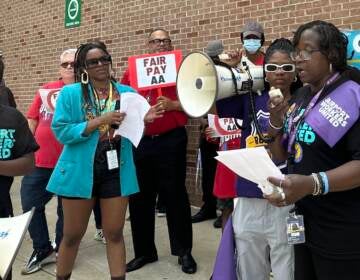It appears to be open season on those standing up against racism
Long before Stephon Clark was shot dead by Sacramento police officers, those who dared to protest police mistreatment of African-Americans became targets.

Demonstrators gather outside the entrance to the Sacramento City Council chambers to protest the shooting death of Stephon Clark by Sacramento police, Tuesday, March 27, 2018, in Sacramento, Calif. Clark, who was unarmed, was shot and killed last week by two Sacramento Police officers responding to a call about a person smashing car windows. (AP Photo/Rich Pedroncelli)
Late Saturday, a car driven by a Sacramento County Sheriff’s deputy struck an activist who was protesting the March 18 shooting death of Stephon Clark at the hands of police.
The California Highway Patrol is investigating the incident in which the deputy left the scene after 61-year-old protester Wanda Cleveland suffered minor injuries.
Some say the deputy’s actions resulted from tensions that have built in the two weeks since police killed Clark in his grandmother’s backyard. But in my view, the conflict that precipitated the deputy’s decision predates the shooting of a black man armed only with a cell phone. In truth, the animosity has been brewing for years.
Long before Clark was shot dead by Sacramento police officers in a hail of bullets that struck him primarily in the back, those who dared to protest police mistreatment of African-Americans became targets.
I believe that targeting was a reaction to the successful tactics used by Black Lives Matter protesters and others. One particularly effective strategy involved blocking highways after high-profile police shootings.
Rather than proposing laws that would make it easier to jail officers who unjustly kill civilians, legislators in numerous states proposed laws to make it easier for drivers to legally hit protesters with their cars.
In North Carolina, for example, HB 330 was introduced after activists protested the police shooting of Keith Lamont Scott in Charlotte. The bill would have excused drivers from liability if they hurt a protester who was blocking traffic.
Similar bills were proposed in Rhode Island, North Dakota, Florida, Tennessee and Texas. The language in most of them was remarkably similar, saying the laws would apply if drivers who hit protesters were “exercising due care,” and protesters were purposefully blocking vehicles.
As far as I know, none of those bills became law, but they didn’t have to. Just proposing them sent a signal that it was open season on protesters — especially those protesting the deaths of black folks.
Ironically, some of the people who’ve been struck by vehicles while protesting racism have been white.
Cleveland, the woman struck by the sheriff’s deputy’s vehicle in Sacramento, is one of them. Heather Heyer, a white woman who joined protests against Klansmen and neo-Nazis in Charlottesville, Virginia, last year, was killed when accused neo-Nazi James Fields drove a car into a crowd.
Their willingness to risk their lives for racial justice highlights the importance of white allies in the fight against racism. Perhaps more importantly, it emphasizes the need for others to join the battle.
Protest in U.S. essential
When she stood in front of that sheriff’s vehicle in Sacramento, Wanda Cleveland understood her First Amendment right to peaceably assemble with like-minded citizens.
Police understand that right, as well. Perhaps that’s why the Sacramento County Sheriff’s Department, in a statement, said protesters were “yelling while pounding and kicking the vehicle’s exterior” in the moments before the deputy’s vehicle hit Cleveland.
That could mean the protest was not peaceful, and authorities could try to use that description to justify the deputy’s actions.
But peaceful or not, protest in America is not only necessary — it is mandatory. When Americans are faced with a system that would kill a man armed only with a cell phone, protest must take place. In a system that would allow officers to mute their body cameras rather than administer first aid while Clark lay dying, protest is the right response.
If we are the country we say we are, we must be an America where life is the first inalienable right, where all men are created equal, and where freedom is the ultimate goal.
Until we become that America, every one of us — no matter what color — should be protesting in the streets.
—
Listen to Solomon Jones Monday to Saturday from 10 to noon on Praise 107.9 FM, and meet him on Wednesday, April 4, from 12:30 to noon at “A Prayer For The City” at the center of Philadelphia City Hall’s courtyard.
WHYY is your source for fact-based, in-depth journalism and information. As a nonprofit organization, we rely on financial support from readers like you. Please give today.





